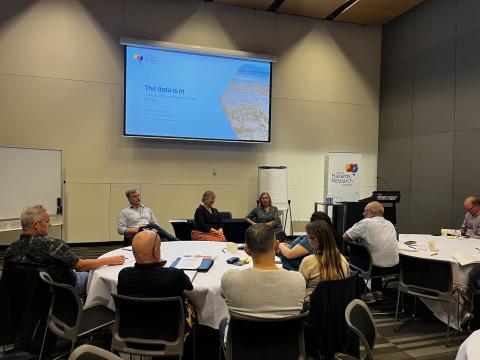


Flood professionals and community members from across Australia and internationally gathered in Brisbane for the 2024 Floodplain Management Australia Conference in May.
Natural Hazards Research Australia (the Centre) ran two pre-conference workshops on the first day and supported several researchers to speak in the main program.
FMAConf24 was hosted by Floodplain Management Australia (FMA), the peak national body for flood risk practitioners, at the Brisbane Convention and Exhibition Centre. The conference brought together flood experts, professionals, local government and stakeholders from across the globe to share knowledge, experiences and innovative solutions to floodplain management and flood risk reduction.
The morning workshop sessions began with The data is in – How can we use research to shape change? with Centre researchers A/Prof Mel Taylor (Macquarie University, NSW DCCEEW), Dr Carla Mooney (Bureau of Meteorology) and Dr Darryl Stellmach (University of Tasmania).
A/Prof Mel Taylor presented the findings of her post-event flood research conducted in Queensland and New South Wales. Mel went through the methodology, focusing on trauma-informed data collection, and demonstrated how the findings provide insight for agencies, government departments and recovery bodies to use for planning for community preparedness, response and recovery.
Dr Carla Mooney shared her research on preparing systems, people and public messaging to reduce the impact of flash floods. Carla’s research showed the gap between people’s perceived understanding of flood readiness, versus their actual preparedness.
Dr Darryl Stellmach’s research on community preparedness through the experiences of the Tasmania State Emergency Service flood warning systems is working to improve future flood warning systems and community disaster preparedness programs.
The researchers then got into interactive activities with workshop participants to demonstrate and unpack emergency warning systems and the flow of communication before, during and after floods. All three researchers also presented in the conference main program.

The Centre sponsored Prof Gavin Smith from North Carolina State University to present the afternoon workshop. Gavin led an incredibly insightful presentation, sharing his experience and research on leading buyouts and relocation programs in the United States. Gavin highlighted the complexity of these programs, using case studies and lessons to inform future community flood resilience programs, touching on issues such as people’s attachment to place and the challenges of open space planning.
He also provided positive stories from case studies that had succeeded through intense community consultation and implementing flood resilience into town planning. Workshop participants were invited to ask questions throughout the session, fostering an excellent exchange of knowledge from flood engineers right down to the local government level.
Prof Gavin Smith also presented the conference opening keynote, (pictured above) again sharing his lessons from large-scale American buyouts and relocation programs after severe floods and hurricanes. His international perspective was invaluable to the diverse group of delegates at FMAConf24.
On the final day, Centre researcher Prof Paula Jarzabkowski (University of Queensland) gave a lively presentation of her project on making disaster insurance an opportunity for risk reduction. Dr Minna Saaristo (Environmental Protection Authority Victoria) presented findings from the Flood contamination sampling and analysis project, detailing contaminants of emerging concern.